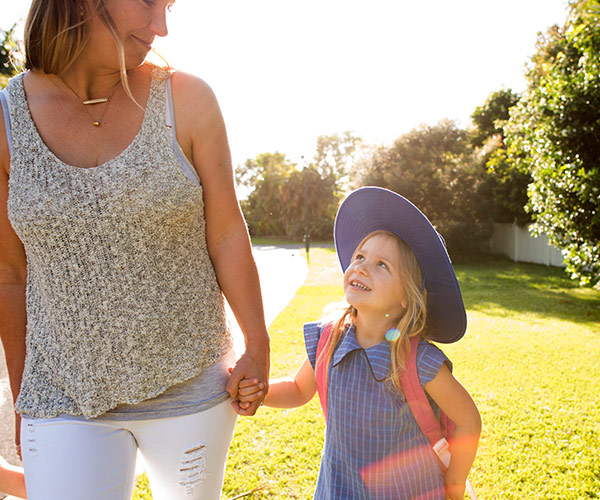If your little one is about to enter the wonderful world of ‘big school’, you may be wondering exactly what skills they should have before they are ready to leave the cottonwool-encased environment of daycare or being at home with you.
Parenting educator Lois Haultain explains the main areas every preschooler should be competent in before graduation day. But remember, it’s important to not force your little one to try to master these skills before they enter kindergarten if they haven’t quite got them down pat.
“Parents need to be very natural and not pushy,” says Haultain. “Don’t make learning these skills a chore – just make it fun!”
1. Wipe own bottom
By age four, most children will be competent at wiping their own bottom. If you’re still undertaking this post-poo task, Haultain says it’s time to step back.
“It’s important children have independent skills like this,” she says. “Most kids are fine with it and it’s often the parents who aren’t OK. You have to allow for a few ‘imperfect’ moments – expect runway strips on their undies for a while!”
Haultain adds it’s important your child can also wipe their other end – their nose. “Kids actually need to be taught to blow on one side then the other,” she explains.
2. Talk about feelings
“Having your child be able to talk about their feelings is a great way to prepare them for the social interactions they’re going to be having at school,” says Haultain, adding that the best way for parents to encourage this skill is to model it in their own behaviour.
Parents need to say, “I feel worried, happy, or sad” where appropriate, without talking about anything too heavy.
3. Recognise their own name
While many parents worry about their darling little one not being able to spell their name before school, Haultain says it’s the ability to recognise it that’s important.
“If your child’s at preschool, they probably have their own name on things. If not, you can do it at home – put their name on a bag, hat and lunchbox. If they see it enough they’ll recognise it,” Haultain says, adding that it will help your child gain a sense of ownership and responsibility.

Putting your child’s name on their belongings is a great way for them to learn to recognise their own name.
4. Take turns
We shouldn’t have unrealistic expectations of our children in terms of sharing.
“As adults, we don’t just let the neighbour use our car whenever they want to,” Haultain points out, but your child does need to have a concept of taking turns to be socially ready for school.
“You can reinforce the idea when you’re interacting with your child by saying, ‘Now it’s Mum’s turn, now it’s your turn’,” Haultain suggests.
5. Be creative
Let’s face it, art and craft will probably be your child’s main area of study during their first year at school, but don’t underestimate its importance or think it can’t be prepared for.
“It’s good to have a creative area of the house where the child has pencils, paper and blunt-ended scissors to begin cutting things out,” suggests Haultain. “Developing these fine-motor skills is great readiness for school.”

Children should have a space in the house where they can be creative using their imagination to draw and develop fine-motor skills by cutting with blunt scissors.
6. Accept routines
Most schools run by a very strict schedule, which can be daunting for some little kids if they’re not used to it, while others will find it quite reassuring. Haultain says the best way to prepare your child is to introduce the idea of having a routine at home. Not that you need to run your household like a drill sergeant, she says.
“Have a shape to each day, or even just an order in which you do things before you go to bed. Once a routine is really known, the child can do it on their own without being directed, which again helps their independent skills.”
7. Know what’s similar and different
It’s probably a skill you haven’t really thought about, but Haultain says that being able to teach your child about what’s similar and different is a “great educational skill to develop.”
You can easily incorporate this type of learning into everyday life by saying things like, “These are the same colour” or “This is longer than that”.
8. Tell stories
“Learning to tell a story is one of the first things they do at school, even before they really learn how to spell,” says Haultain.
How can you help your littlie with this skill? Simple: to encourage your child to speak more, scaffold their storytelling with suggestions and assist in their language development, it’s just important you listen to them and respond.
9. Counting to 100
“Counting is fun and it’s a good idea to start noticing the number of things with your child, such as, ‘How many cars can you see?’ But it’s better for them to understand clusters of things, rather than just recognising the numeral. Being able to count to 10 is a great place to start.”

